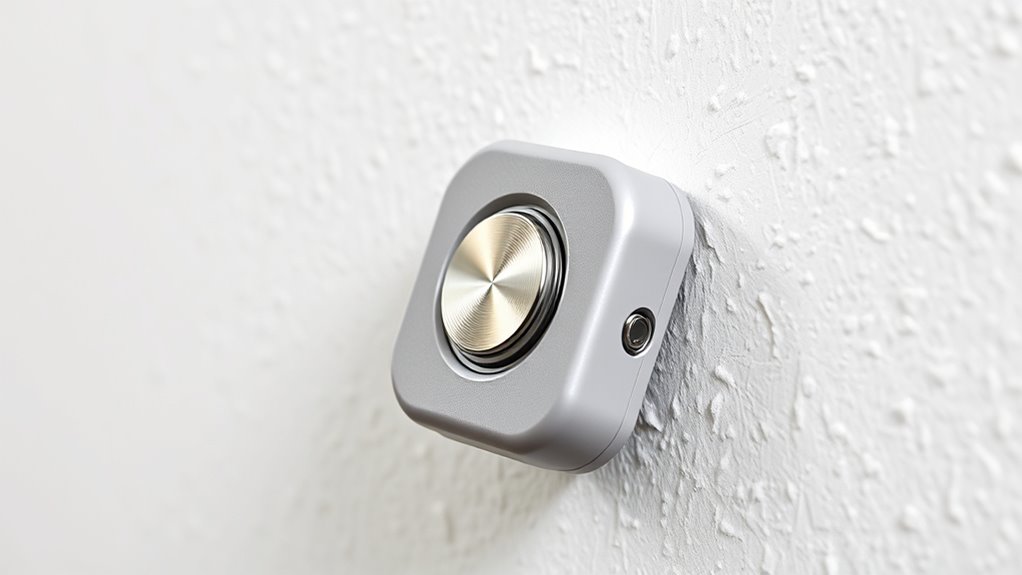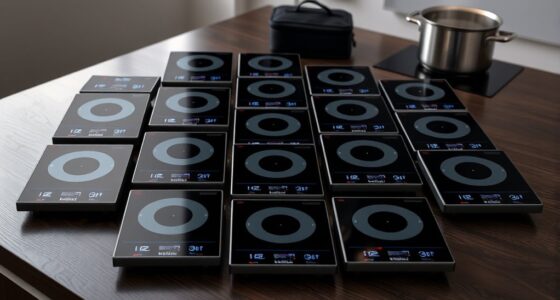If you’re looking for the best magnetic stud finders to make wall checking quick and precise, I recommend options like the StudBuddy, CH Hanson models, Kreg, and Klein Tools, which offer strong magnets, built-in levels, and easy operation. These tools are reliable for locating nails or screws behind drywall without batteries. To find out which one fits your needs and get tips on choosing the right model, keep exploring the details below.
Key Takeaways
- Magnetic stud finders detect nails, screws, and metal fasteners behind drywall, ensuring accurate wall stud location without batteries.
- Look for models with strong neodymium magnets and built-in levels for reliable, easy-to-read results.
- Consider tools that combine magnetic detection with electronic sensors for enhanced precision and versatility.
- Choose lightweight, portable magnetic finders suitable for DIY projects, quick assessments, and hanging tasks.
- Review user feedback on magnetic pull strength and durability to ensure consistent, accurate wall detection.
The Original StudBuddy Magnetic Stud Finder Tool
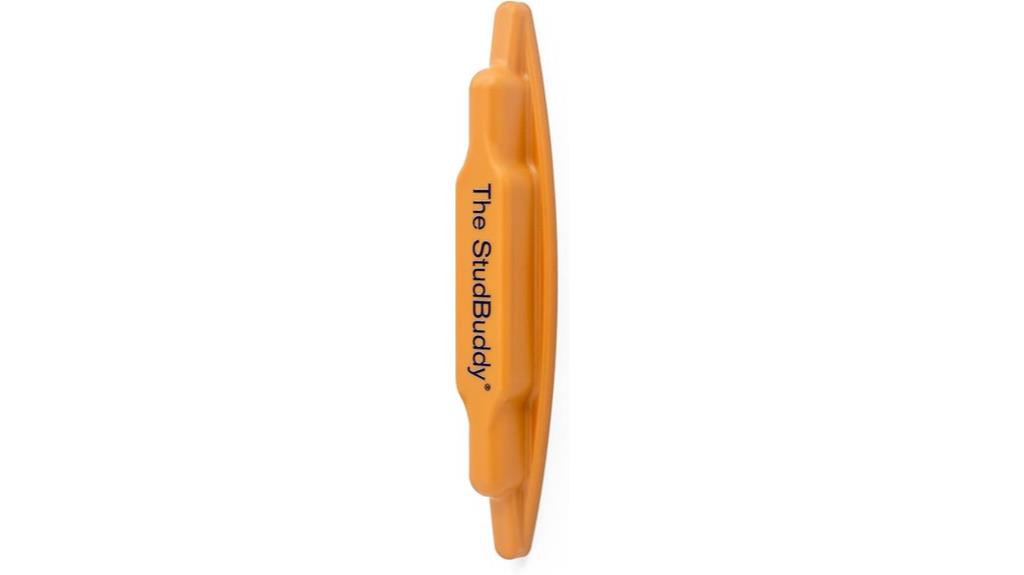
If you’re looking for a reliable and straightforward tool to locate wall studs, the Original StudBuddy Magnetic Stud Finder is an excellent choice. I love how simple it is—no batteries or moving parts needed. Made in the USA from durable materials, it’s built to last. Just move it across the wall, and the powerful neodymium magnets will stick to screw or nail heads, revealing the stud’s position instantly. It works perfectly on drywall and wood, making it ideal for DIY projects or professional jobs. Its reliability and ease of use make it one of my top recommendations for anyone wanting quick, accurate wall stud detection.
Best For: DIY enthusiasts and professionals seeking a simple, reliable, and battery-free tool for quick wall stud detection on drywall and wood surfaces.
Pros:
- No batteries or moving parts required, ensuring long-lasting reliability
- Made in the USA from durable, high-quality materials
- Easy to use—simply move across the wall to detect screw or nail heads instantly
Cons:
- Not suitable for use on lath and plaster walls
- Magnetic detection may be less effective if nails or screws are not present or are deeply embedded
- Limited to drywall and wood surfaces, restricting its versatility on other wall types
CH Hanson 03040 Magnetic Stud Finder
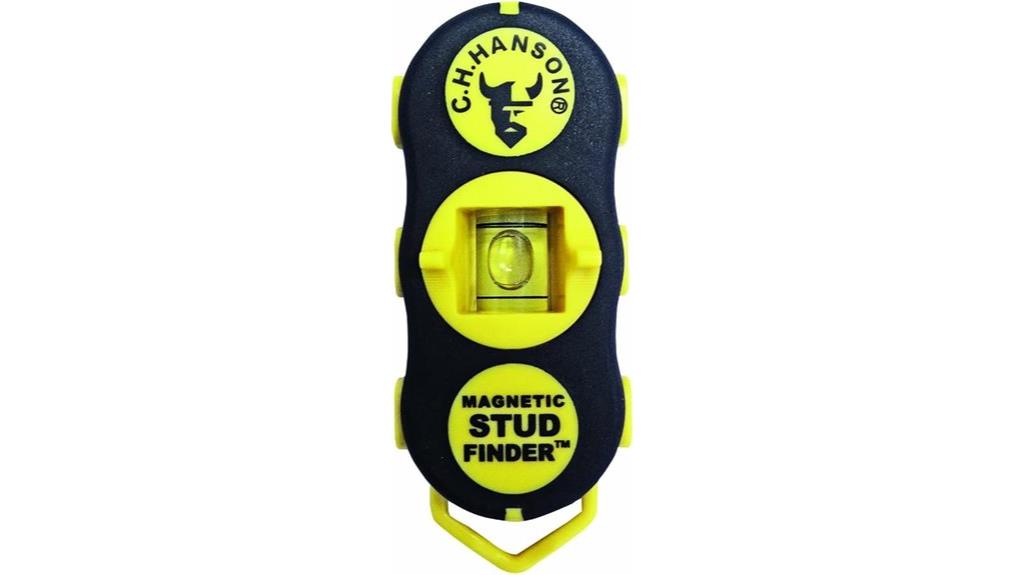
The CH Hanson 03040 Magnetic Stud Finder stands out for its simplicity and reliability, making it an excellent choice for DIYers and professionals alike who want a quick, hands-on tool. Its compact, yellow plastic design is lightweight and easy to handle, weighing just 2.39 ounces. Without needing batteries, it’s ready to use right out of the box, relying on a powerful magnet and built-in liquid leveler for precision. This tool effectively locates nails, screws, metal studs, and conduit behind walls, making wall mounting tasks straightforward. Its high customer ratings and affordability make it a dependable, practical addition to any toolbox.
Best For: DIYers and professionals seeking a simple, reliable magnetic stud finder for quick wall mounting and metal detection tasks.
Pros:
- Strong magnetic pull effectively locates nails, screws, and metal studs behind walls
- No batteries required, providing maintenance-free, ready-to-use convenience
- Compact and lightweight design with a built-in liquid leveler for added precision
Cons:
- Limited to metal detection; cannot locate wood studs or non-metal objects
- Magnetic strength may vary depending on wall material and magnetic surface
- Not suitable for use in extremely thick or dense walls where magnetism is hindered
Kreg Magnetic Stud Finder with Laser-Mark
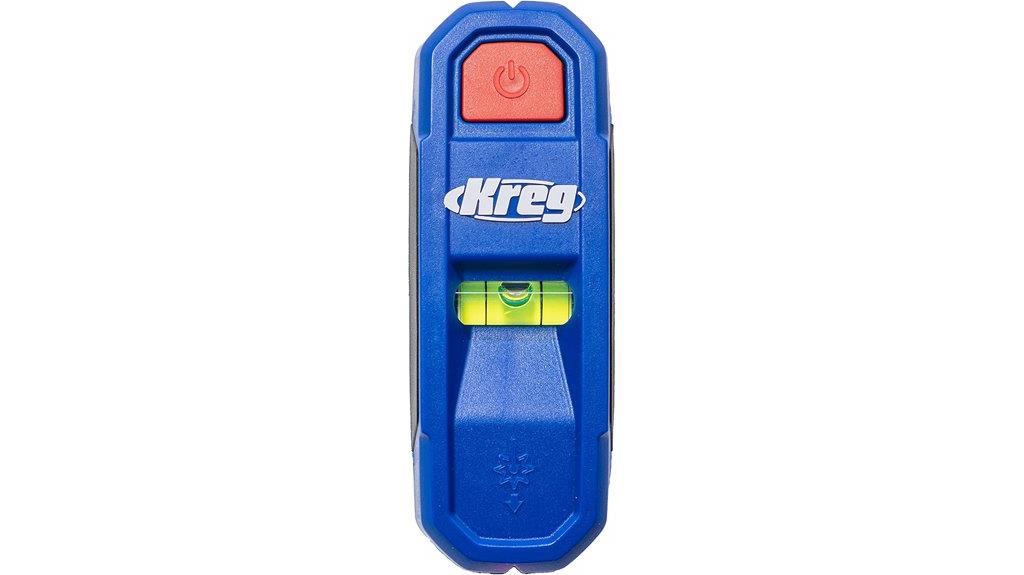
Designed for both professional carpenters and DIY enthusiasts, the Kreg Magnetic Stud Finder with Laser-Mark stands out with its innovative combination of magnetic detection and laser-guided marking. It uses two rare-earth magnets to quickly locate metal studs or nails, attaching firmly for hands-free operation. The laser projection precisely marks the stud’s location, making it easier to hang or drill accurately. Its compact, lightweight design, along with a high-visibility bubble level, ensures easy handling and reliable measurements. Though it works best on drywall, it’s a versatile tool that simplifies wall scanning, offering accuracy and convenience for a variety of home improvement projects.
Best For: DIY enthusiasts and professional carpenters seeking a precise, multi-function wall scanner for hanging, drilling, or general wall inspection projects.
Pros:
- Combines magnetic detection with laser-guided marking for enhanced accuracy
- Compact, lightweight design for easy handling and portability
- Features a high-visibility bubble level for reliable vertical alignment
Cons:
- Less effective on complex or multi-layer walls like lathe and plaster
- Laser projection range is limited to one end, reducing flexibility over large surfaces
- Potential for false positives if nails or screws are misplaced or absent
CH Hanson 03040 Magnetic Stud Finder Pack of 2
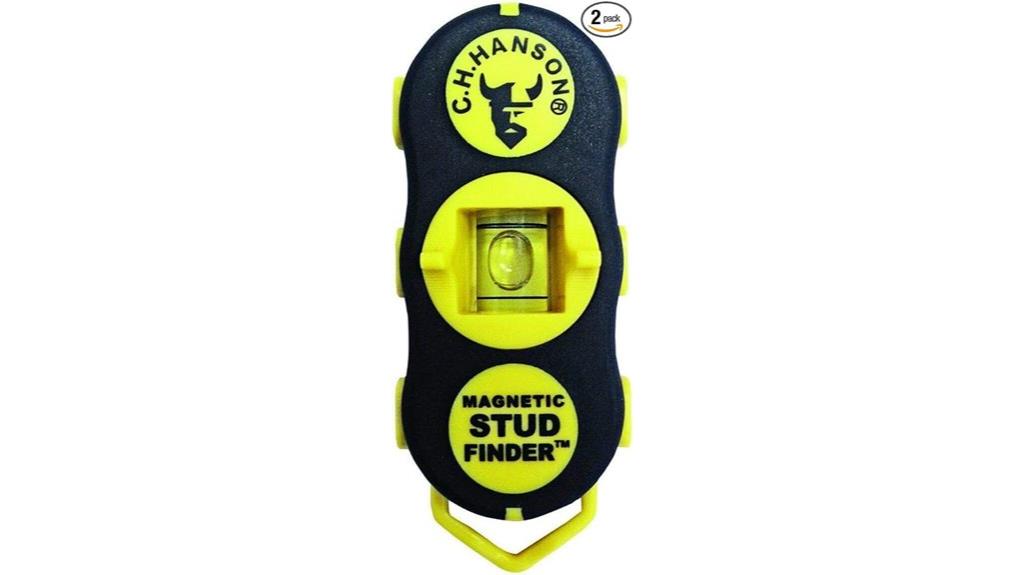
For those seeking a simple, reliable way to locate metal fasteners behind walls, the CH Hanson 03040 Magnetic Stud Finder Pack of 2 stands out as an excellent choice. These compact, pocket-sized tools measure just 8 x 4 x 2.7 inches and weigh only 1.6 ounces, making them easy to carry and handle. Crafted with durable casing and a soft grip, they include a built-in level for accurate marking. Their powerful rare earth magnets effortlessly attach to nails, screws, or other metal fasteners, simplifying the detection process. No batteries or calibration are needed, making them straightforward for DIYers and professionals alike.
Best For: DIY enthusiasts, homeowners, and professionals seeking a simple, reliable, battery-free tool for locating metal fasteners behind walls.
Pros:
- Compact, lightweight, and pocket-sized for easy handling and portability
- No batteries or calibration required, ensuring straightforward operation
- Durable construction with a strong magnet that reliably detects metal fasteners and objects
Cons:
- Cannot detect wooden studs without metal fasteners, limiting its use in some wall types
- Less effective if metal fasteners are sparse or absent in the wall structure
- May require multiple passes or careful movement to locate fasteners in certain wall conditions
Klein Tools Magnetic Stud Finder and Level
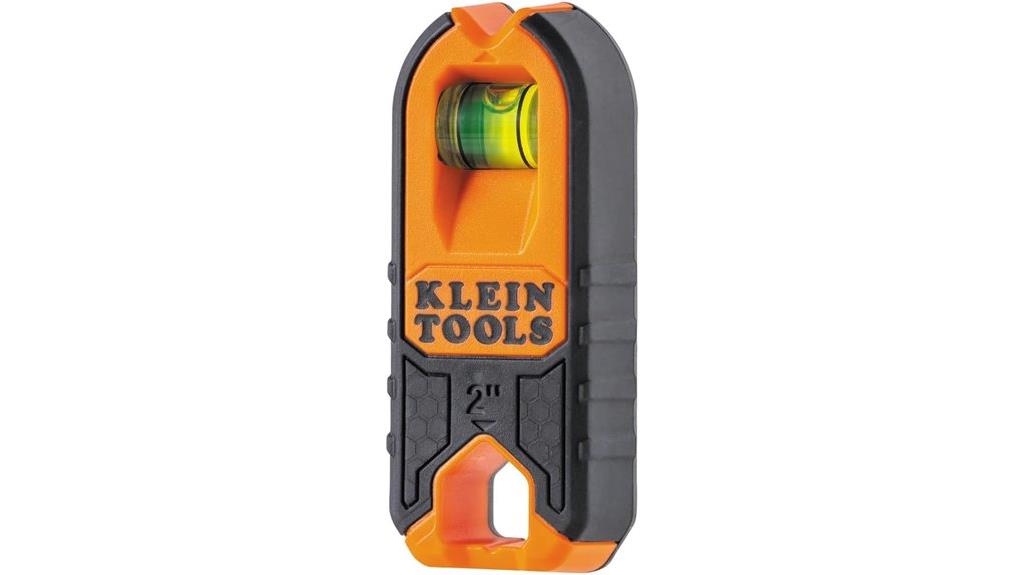
If you’re looking for a reliable tool that combines magnetic stud detection with precise leveling, the Klein Tools Magnetic Stud Finder and Level is an excellent choice. Its powerful rare-earth magnet quickly locates metal studs and fasteners within wooden studs, saving you time and effort. The bubble vial ensures accurate markings and alignment, making your wall work more precise. Plus, the felt pad backing protects drywall and plaster surfaces from scratches during use. This compact, versatile tool is perfect for anyone needing dependable stud detection combined with level functionality, streamlining your wall projects with confidence and ease.
Best For: DIY enthusiasts and professionals seeking a reliable magnetic stud finder with integrated level for precise wall measurements and surface protection.
Pros:
- Combines magnetic stud detection with built-in leveling for versatile use
- Features a bubble vial for accurate markings and alignment
- Felt pad backing prevents surface scratches during use
Cons:
- May require multiple readings for optimal accuracy on textured walls
- Limited to detecting metal studs and fasteners, not wooden studs directly
- Compact size might be less effective on very thick or textured surfaces
The Original StudBuddy Plus Magnetic Stud Finder with Level
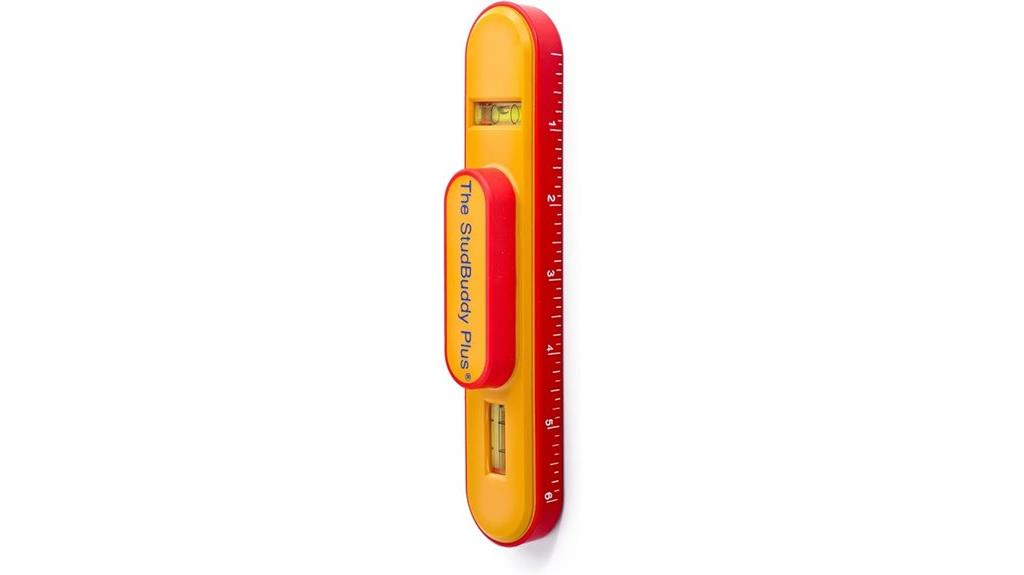
The Original StudBuddy Plus Magnetic Stud Finder with Level stands out as an excellent choice for DIYers and professionals seeking a simple, reliable tool without the hassle of batteries or calibration. Made in the USA, it’s compact, durable, and uses powerful neodymium magnets to locate screws or nails in studs quickly. Just slide it across the wall; when a magnet sticks, you’ve found the stud. The built-in level helps make certain your hangings stay straight. Ideal for drywall and wood studs, it works through wood paneling and requires no batteries or moving parts. Its straightforward design makes it a cost-effective, dependable tool for everyday wall projects.
Best For: DIYers and professionals seeking a simple, reliable, and battery-free stud finder with built-in level for drywall and wood wall projects.
Pros:
- No batteries, calibration, or moving parts needed for operation.
- Strong neodymium magnets provide quick and accurate detection of studs.
- Compact, durable, and includes a built-in level for straight hanging.
Cons:
- Not suitable for lath & plaster walls or metal/concrete surfaces.
- Does not detect small nails, metal studs, or offer depth scanning features.
- Limited to drywall and wood studs, may not work effectively on non-wood surfaces.
MagnetPal 3 Pack Heavy-Duty Neodymium Magnets
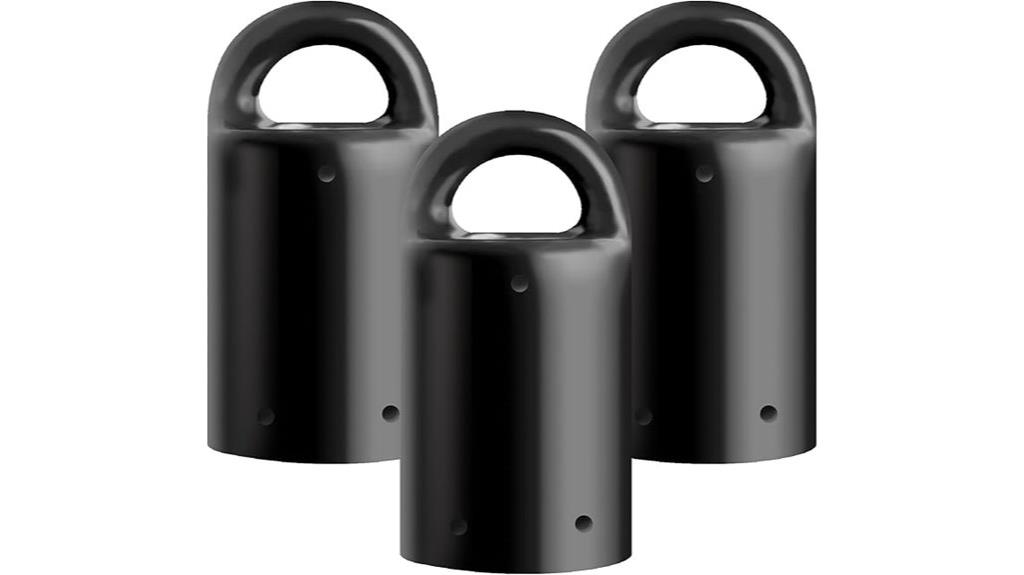
MagnetPal’s 3 Pack Heavy-Duty Neodymium Magnets stand out as an excellent choice for anyone needing reliable, powerful magnets for various DIY and organizational tasks. These durable, anti-rust black round magnets come with key rings and can hold up to 12 pounds of metal, making them versatile for indoor and outdoor use. Whether locating studs behind drywall, hiding keys under vehicles, or securing notes on magnetic surfaces, they excel. Each magnet measures about 0.5 x 0.5 x 1.2 inches and features a quick-release keychain. Praised for strength and ease of use, they’re a practical, heavy-duty solution for home, workshop, or outdoor projects.
Best For: DIY enthusiasts, homeowners, and professionals seeking powerful, versatile magnets for organization, mounting, and outdoor applications.
Pros:
- Super strong magnetic pull capable of holding up to 12 pounds of metal
- Durable neodymium construction with anti-rust coating for long-lasting use
- Comes with a quick-release keychain, making it easy to handle and attach
Cons:
- Plastic housing may be flimsy and prone to breaking if mishandled
- Extremely powerful magnets can pose safety risks, especially to children
- Not suitable for non-magnetic surfaces like aluminum or certain appliances
52300 Studball, 27 Pounds of Pull Power Magnetic Stud Finder

For anyone seeking a reliable, battery-free magnetic stud finder, the 52300 Studball stands out with its impressive 27 pounds of pull force. Its strong magnet quickly detects screws or nails behind drywall, wood, ceramic tile, or plywood, often in less than a minute. Designed for simplicity, I just run it along the wall, and it instantly locates metal objects without complex markings. Plus, its magnetic power isn’t limited to stud detection—I can use it to retrieve fallen items, hang tools, or find small metal objects. The Studball’s strength, versatility, and ease of use make it an excellent choice for any DIYer or professional.
Best For: DIYers and professionals seeking a reliable, battery-free magnetic stud finder for quick and easy detection of metal objects behind various wall materials.
Pros:
- Strong 27-pound pull force for quick and reliable detection of nails and screws
- No batteries required, making it simple and low-maintenance
- Versatile use for retrieving small metal objects, hanging tools, or other household tasks
Cons:
- Limited to detecting ferrous metal objects, not non-metallic materials
- May require careful handling to avoid missing subtle nail or screw positions
- Less effective on very thick or dense wall materials beyond its specified range
2 PCS Magnetic Stud Finder
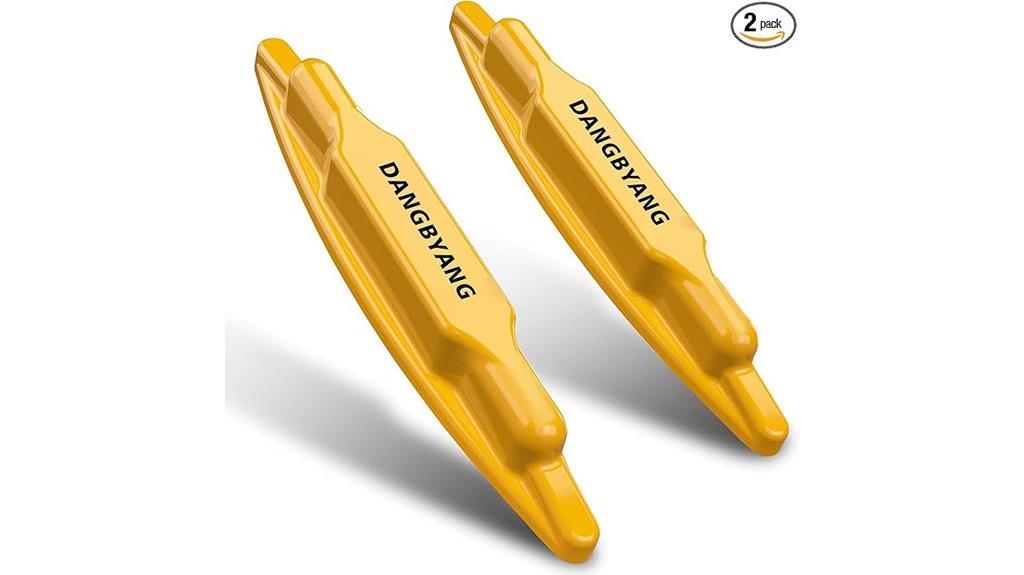
If you’re looking for a simple, reliable tool to locate studs behind drywall, the PCS Magnetic Stud Finder is an excellent choice. It’s easy to use—just slide it along the wall to find screws or nails that indicate studs. No batteries or calibration needed, making it quick and hassle-free. Crafted from durable plastic with strong neodymium magnets, it securely sticks to the wall when a screw or nail is detected, confirming the stud’s location. With a compact design and ergonomic grip, it leaves no damage or marks. Highly rated for accuracy, it’s perfect for hanging shelves, frames, or other wall projects in all drywall types.
Best For: DIY enthusiasts, homeowners, or anyone seeking a simple, reliable tool for locating wall studs without the need for batteries or calibration.
Pros:
- Easy to use with no setup or calibration required.
- No batteries needed, making it convenient and low-maintenance.
- Compact, durable design with strong neodymium magnets for reliable detection.
Cons:
- Magnet strength can vary, sometimes less effective on certain nails or screws.
- Not suitable for lath and plaster walls, limiting its use on some older constructions.
- May not provide the same precision as electronic stud finders for detailed wall scanning.
CH Hanson 03040 Magnetic Stud Finder, 2 Pack
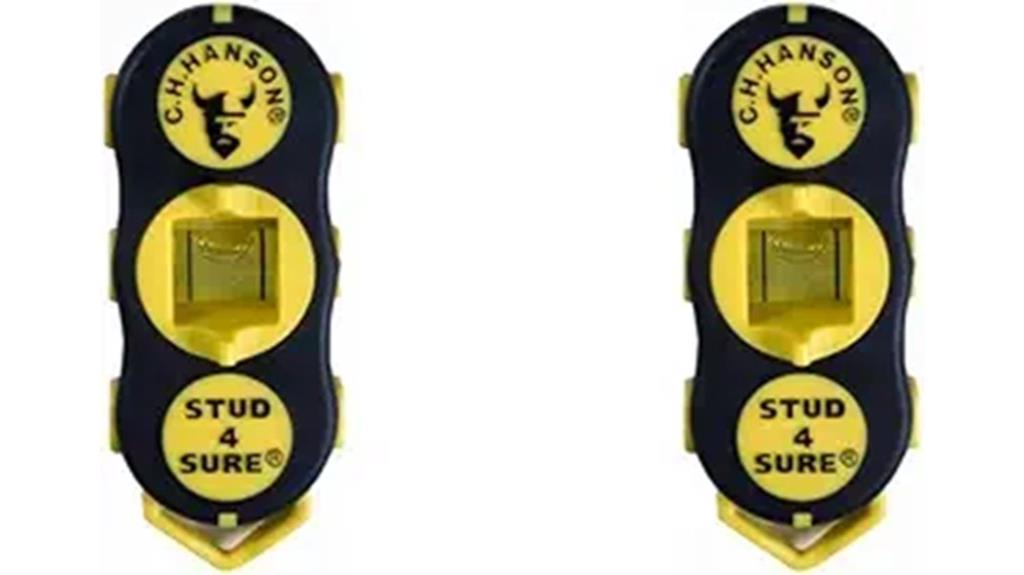
The CH Hanson 03040 Magnetic Stud Finder, 2 Pack is perfect for DIY enthusiasts who want a simple, battery-free tool to locate nails or screws behind drywall. Its compact size—measuring 4.6 x 1.5 x 1 inches—and lightweight design make it easy to handle and carry around. Relying on magnetic attraction, it helps you find metal fasteners hidden in walls, ideal for hanging pictures or installing shelves. While some users note that the magnetic pull can be weaker than expected, it’s a reliable last-resort option for quick, small tasks. Overall, it’s straightforward, affordable, and great for basic wall assessments.
Best For: DIYers and homeowners seeking a simple, battery-free tool to locate nails or screws behind drywall for quick, small tasks.
Pros:
- Easy to use and portable due to compact size and lightweight design
- Battery-free, requiring no power source or setup
- Effective for quick wall assessments and hanging projects
Cons:
- Magnetic pull strength can be weaker than expected, requiring multiple passes
- Less reliable for precise stud locating compared to electronic scanners
- May not work well on thicker or non-metallic wall materials
Franklin Sensors ProSensor M210 Stud Finder
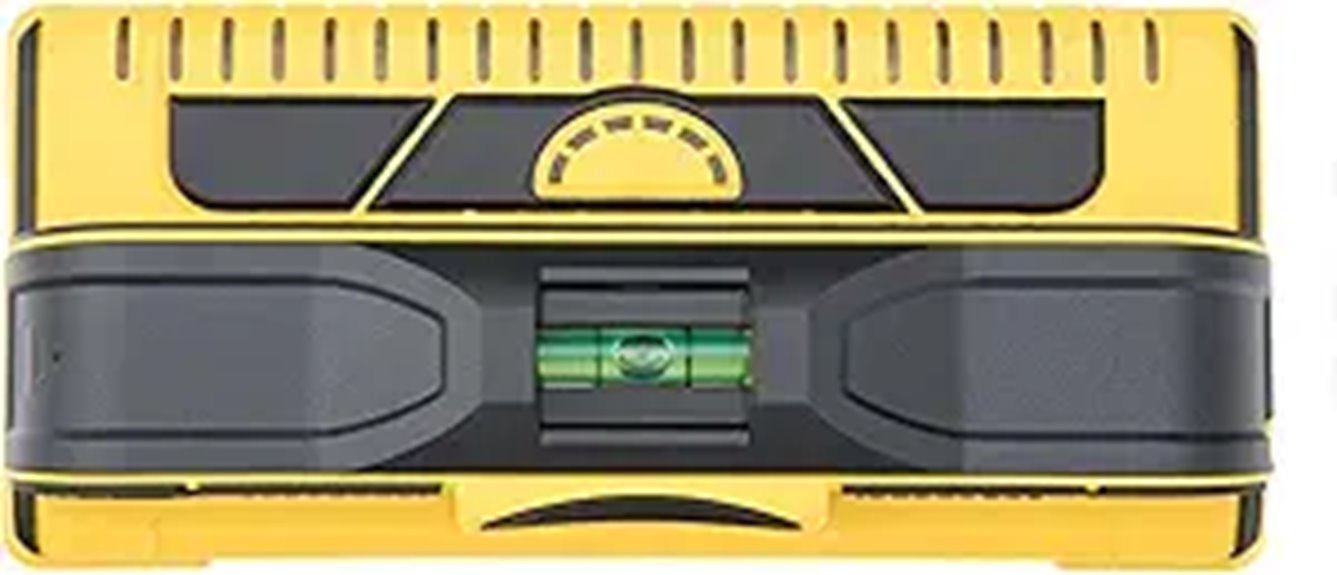
The Franklin Sensors ProSensor M210 stands out as an excellent choice for those seeking precise wall scanning, thanks to its 13 patented sensors that detect both wood and metal studs, drywall, and live wires with high accuracy. Its wide LED display shows both the center and edges of studs simultaneously, making it easy to interpret. The deep scanning capability reaches up to 1.7 inches and auto-adjusts for wall material and texture. Compact and durable, it’s rated highly by both consumers and professionals. With safety features like a built-in live wire detector, it’s a reliable tool for accurate wall work, whether for DIY projects or professional use.
Best For: DIY enthusiasts and professionals seeking highly accurate wall detection for safe, efficient drilling and remodeling projects.
Pros:
- Equipped with 13 patented sensors for precise detection of wood, metal studs, drywall, and live wires
- Wide LED display shows both the center and edges of studs simultaneously for easy interpretation
- Deep scanning up to 1.7 inches with auto-adjustment for wall material and texture
Cons:
- Battery compartment cover can be cumbersome and may loosen over time
- Performance depends on using fully charged, high-quality batteries, which can be inconvenient
- Slight sensitivity to voltage fluctuations may affect operation with lower-voltage batteries
Moonoom 2 Pcs Magnetic Stud Finder for Drywall

For DIY enthusiasts and homeowners seeking a simple, battery-free tool, Moonoom’s 2 Pcs Magnetic Stud Finder for Drywall offers an easy way to locate nails and screws behind walls. Each lightweight, ergonomic piece measures just 0.9 by 5.5 inches, making them easy to handle and store. These magnetic finders detect metal fasteners by gliding across the wall surface, with no batteries or moving parts needed. They work well on drywall, helping you avoid blind drilling and wall damage. While their magnetic strength isn’t as powerful as professional tools, they’re affordable, portable, and perfect for quick, occasional use during home projects.
Best For: DIYers, homeowners, and casual users looking for a simple, battery-free stud finder for drywall projects.
Pros:
- No batteries or power source required, making it easy to use anywhere
- Compact, lightweight design for portability and easy storage
- Affordable and suitable for quick, occasional wall inspections
Cons:
- Magnetic strength may be weaker compared to professional electronic stud finders
- Less precise on irregular, thick, or complex wall surfaces
- Not suitable for lath and plaster walls or heavy-duty construction tasks
Magnetic Stud Finder with Bubble Level, Wall Scanner
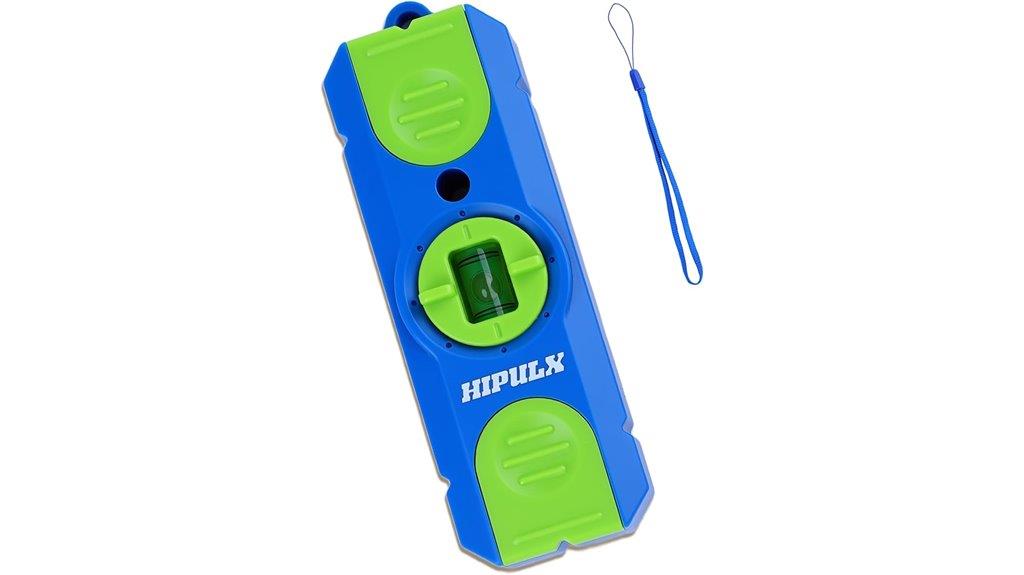
A magnetic stud finder with a built-in bubble level offers precise wall mounting, making it ideal for homeowners and DIY enthusiasts who want reliable results without complicated electronics. Its 360° bubble vial helps guarantee perfect horizontal and vertical alignment when hanging shelves, artwork, or TV mounts. The extra-strong magnet detects nails and screws quickly and reliably in drywall and wooden walls. Compact and durable, it fits easily in pockets or tool belts and operates without batteries, ensuring consistent performance. Included backup rope enhances detection through thicker walls. Overall, this tool combines magnetic detection with leveling, providing a straightforward, dependable solution for accurate wall mounting.
Best For: DIY enthusiasts, homeowners, and professionals seeking a reliable, battery-free tool for accurate wall mounting and leveling.
Pros:
- Strong magnet for quick and reliable detection of nails and screws in walls
- Built-in 360° bubble level ensures precise horizontal and vertical alignment
- No batteries required, offering consistent, maintenance-free performance
Cons:
- Magnet strength may vary between units, affecting detection reliability
- Some users report magnet falling out over time or reduced magnetic pull
- Limited to magnetic detection, so may not find studs without metal fasteners
CH Hanson 3046 – Magnetic Stud Finder-Pink

If you’re looking for a quick, reliable way to find studs without the hassle of batteries, the CH Hanson 3046 Magnetic Stud Finder-Pink is an excellent choice. Its powerful rare earth magnets easily locate metal and wood studs behind walls. The built-in rotating level helps guarantee accurate horizontal and vertical alignment. Its compact design fits comfortably in my pocket, making it highly portable for any project. Whether you’re remodeling, doing new construction, or tackling DIY tasks, this magnetic finder simplifies the process. No batteries mean one less thing to worry about, and its straightforward functionality gets the job done fast and accurately.
Best For: DIY enthusiasts, homeowners, and professionals seeking a battery-free, portable stud finder for quick wall inspections.
Pros:
- No batteries required, reducing maintenance and cost
- Strong rare earth magnets for reliable metal and wood stud detection
- Compact design with built-in level for accurate horizontal and vertical alignment
Cons:
- Limited to locating metal and wood studs, not ideal for other wall materials
- May require multiple passes for precise location in dense wall structures
- Less versatile compared to electronic stud finders with advanced features
StudPoP Original Magnetic Stud Finder with Visual & Audible Indicators
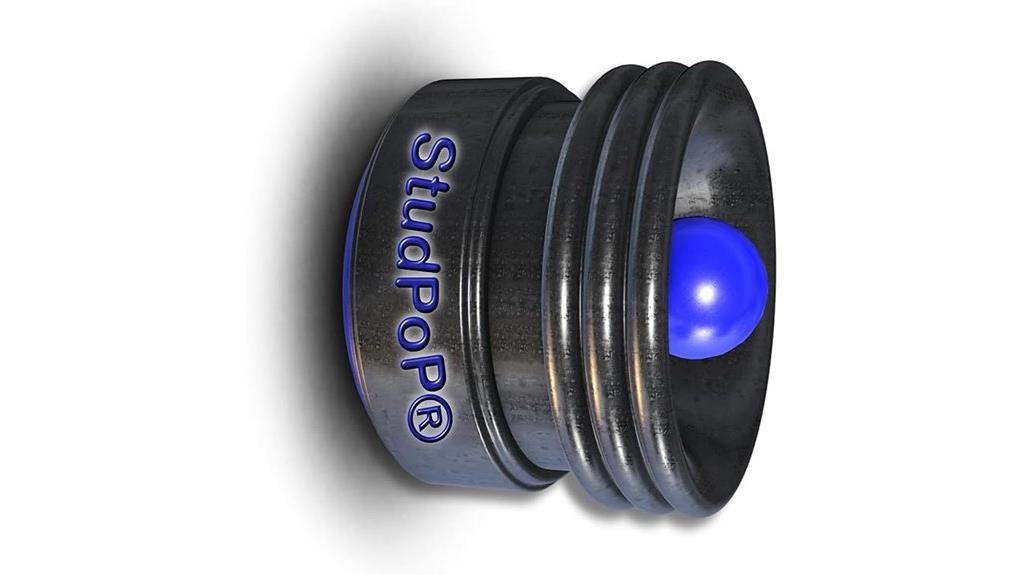
The StudPoP Original Magnetic Stud Finder stands out as an excellent choice for DIYers and homeowners working on older walls where electronic detectors often struggle. Its strong magnet detects nails and screws behind various surfaces like plaster, lath, and tile, providing both visual and audible signals. No batteries or calibration are needed, making it simple and reliable. Lightweight and compact, it’s easy to handle and perfect for quick, accurate stud locating. Many users praise its effectiveness on dense, irregular walls, especially in older homes. Overall, it’s an affordable, straightforward tool that delivers consistent results without the hassle of electronic models.
Best For: DIYers and homeowners working on older or irregular walls who need a simple, reliable stud finder without electronic components.
Pros:
- No batteries or calibration required, ensuring consistent, hassle-free use.
- Effectively detects nails and screws behind dense materials like plaster, lath, and tile.
- Compact, lightweight, and easy to handle, making it ideal for quick, accurate stud locating.
Cons:
- The magnet’s pull can be subtle, requiring careful handling and patience.
- May produce false negatives if nails or screws are absent or misplaced in the wall.
- Slightly slower detection process compared to electronic stud finders, needing careful, slow movement.
Factors to Consider When Choosing Magnetic Stud Finders
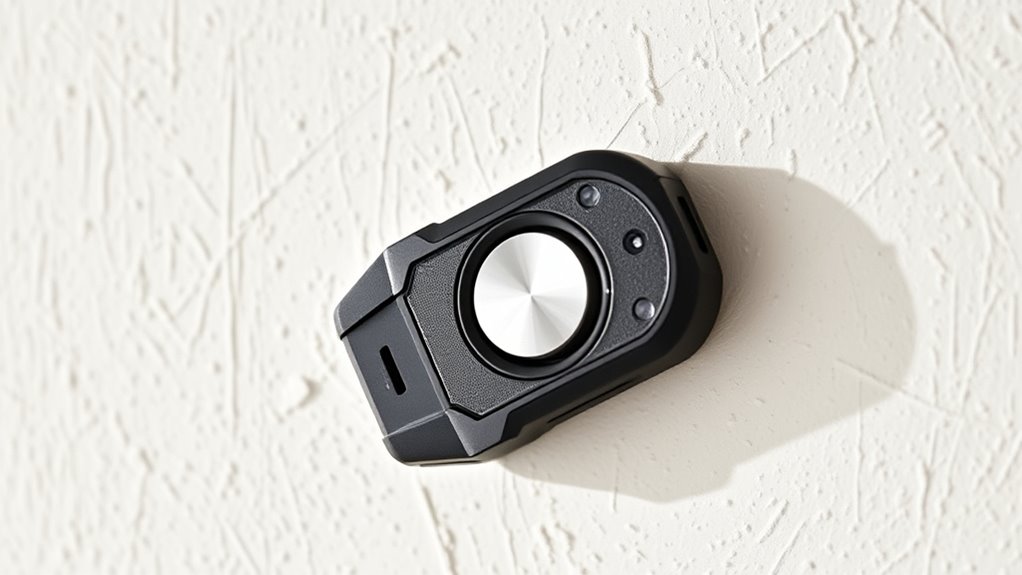
When choosing a magnetic stud finder, I look at factors like magnet strength and pull to guarantee it can detect nails through walls. I also consider wall compatibility, size, and portability to match my projects and workspace. Additionally, I value ease of use, durability, and quality materials for reliable, long-lasting performance.
Magnet Strength and Pull
Magnet strength plays a crucial role in how effectively a magnetic stud finder detects metal fasteners behind walls. A stronger magnet provides more reliable and faster results, especially when dealing with thicker or denser materials. Pull force, measured in pounds, indicates how much weight the magnet can hold and its ability to locate embedded nails or screws easily. Over time, magnets can weaken or become damaged, reducing their effectiveness, so choosing a model with a high pull force is essential. A magnet with insufficient strength may struggle to attach securely, resulting in false negatives. However, stronger magnets also come with safety considerations, like pinching fingers or attracting unintended metal objects, so handling them carefully is a must.
Wall Compatibility Factors
Choosing a magnetic stud finder that works well with your wall type requires considering how compatible it is with the materials behind the surface. Magnetic stud finders excel on drywall and wooden walls because they detect metal fasteners like nails or screws directly. However, they’re usually ineffective on lath and plaster walls, which often lack accessible metal fasteners. The magnet’s strength and the presence of metal within the wall structure greatly influence accuracy. Dense or irregular materials can weaken the magnet’s ability to detect metal, reducing reliability. Compatibility is best when metal studs or fasteners are evenly spaced and easily accessible, allowing the magnet to attract consistently. Understanding your wall’s composition helps ensure you choose a magnetic stud finder that provides accurate and dependable results.
Size and Portability
The size and portability of a magnetic stud finder directly impact how easily you can use it across different projects. A compact, lightweight model is easier to handle and transport, making it perfect for quick, on-the-go tasks. Smaller tools fit comfortably in a pocket or tool belt, so you can multi-task or move between rooms without hassle. While larger magnetic stud finders may provide a bigger detection surface, they tend to be less portable and more cumbersome to carry around. The overall size also affects storage, especially if you keep your tools in a kit or drawer. Ultimately, choosing a size that balances detection capabilities with portability helps improve your efficiency and convenience during wall projects.
Ease of Use Features
When selecting a magnetic stud finder, ease of use is a key factor that can make your projects smoother and quicker. Many models are designed for simple, intuitive operation, often requiring just a quick slide across the wall to locate metal fasteners. Features like built-in levels or visual indicators help guarantee precise alignment when marking or hanging objects, reducing guesswork. Strong, encapsulated neodymium magnets provide reliable detection with minimal effort, so you don’t need multiple passes. Most magnetic stud finders are battery-free and don’t require calibration, allowing immediate use straight out of the package. Their compact, lightweight build improves handling and portability. All these features contribute to a tool that’s straightforward to operate, saving you time and frustration during your wall assessments.
Durability and Material
Durability and material quality are essential factors to contemplate because a magnetic stud finder needs to withstand frequent use and potential mishaps. High-quality plastics or metals are common choices, as they resist wear, impact, and environmental damage. Encapsulated neodymium magnets maintain their strength and resist corrosion, ensuring long-term reliability. The material choice directly influences the tool’s ability to handle drops or bumps without cracking or breaking. A well-designed body with reinforced edges can prevent damage and extend the lifespan of the device. Additionally, lightweight yet sturdy materials offer comfort during extended use while maintaining durability. When selecting a magnetic stud finder, paying attention to these material aspects guarantees a more reliable, long-lasting tool that will serve you well through many projects.
Additional Tools and Features
Choosing the right magnetic stud finder involves considering additional tools and features that can make your task easier and more accurate. Built-in levels, laser guides, or bubble vials help you mark stud locations precisely, saving time and effort. Some models come with backup ropes or magnetic hooks, adding versatility when working on walls or ceilings. Features like multiple magnets or wider detection surfaces improve reliability across different wall types, ensuring you find metal fasteners more consistently. Visual and audible indicators, such as clicking sounds or flashing lights, confirm detection without manual checks, increasing confidence. Enhanced capabilities like deep wall detection or multi-sensor arrays are especially useful for thicker or irregular surfaces, making your wall-finding experience smoother and more precise.
Frequently Asked Questions
How Does Magnetic Strength Vary Among Different Stud Finders?
Magnetic strength varies quite a bit among different stud finders. Some have powerful magnets that easily attract nails or screws in walls, making them more reliable. Others use weaker magnets, which might require multiple passes or more careful positioning. I’ve found that choosing a stud finder with a strong magnet helps me locate studs quickly and accurately, especially in dense or thick walls. It really makes the job much easier and more efficient.
Are Magnetic Stud Finders Safe for All Wall Types?
Yes, magnetic stud finders are generally safe for all wall types since they rely on magnets to detect metal rather than electrical signals or drilling. I’ve used them on drywall, plaster, and even brick walls without issues. However, I recommend being cautious around electrical wiring or plumbing to avoid accidental contact. Overall, they’re a safe, reliable tool for locating studs regardless of your wall material.
Can Magnetic Stud Finders Detect Non-Metallic Studs?
Magnetic stud finders can’t detect non-metallic studs because they rely on detecting magnetic fields from metal. If your wall has wooden or plastic studs, these tools won’t help. I recommend using electronic stud finders that can detect changes in wall density or signals, making them perfect for locating non-metallic studs. So, magnetic finders are great for metal, but not for non-metallic studs.
How Accurate Are Magnetic Stud Finders Compared to Electronic Ones?
Magnetic stud finders are generally less accurate than electronic ones because they rely on detecting metal nails or screws, which might not always be present or aligned perfectly. Electronic stud finders use sensors to detect changes in wall density, offering more precise and reliable results. I find magnetic ones fun and simple for quick spots, but for serious projects, I prefer electronic models for their better accuracy and consistency.
Do Magnetic Stud Finders Work Through Thick Wall Coverings?
Did you know that magnetic stud finders can detect metal up to 3/4 inch deep? They do work through thick wall coverings, but their effectiveness depends on the material. If your wall is dense or heavily insulated, it might be harder to find the metal inside. Still, magnetic stud finders are perfect for quick, reliable detection of nails or screws in drywall, even behind some thicker materials.
Conclusion
Choosing the right magnetic stud finder simplifies your wall projects, turning a potentially tricky task into a breeze. While some find accuracy in high-tech laser tools, I’ve learned that simplicity often wins—no batteries, no fuss. Just like a reliable friend, a good magnetic finder helps you navigate walls confidently. In the end, whether high-tech or straightforward, the best tool is the one that makes your task easier and more precise.
